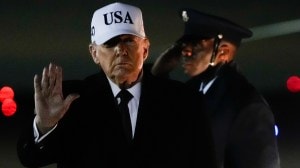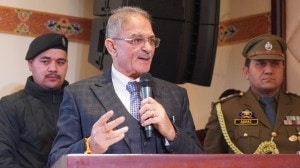Look ahead
The verdict on India-Pakistan non-talks in Colombo is out. One lot was obsessive and neurotic, the other rigid and inflexible.The people ...

The verdict on India-Pakistan non-talks in Colombo is out. One lot was obsessive and neurotic, the other rigid and inflexible.
The people of India and Pakistan probably don8217;t know whether to weep or laugh at high diplomacy turning out like this. But, after long experience of the ways of their leaders, no one will be surprised.
Disagreeing is such an old habit, it takes superhuman effort to see eye to eye about anything at all.
What now? Think positive. With the adjectives and TV cameras out of the way, there8217;s serious work to be done. A positive interpretation of Colombo would be that both prime ministers tried in their separate ways to say, let8217;s look at the problem in a different way.
Atal Behari Vajpayee proposed collective prosperity and Nawaz Sharif tried collective security. The immediate reaction was not encouraging for either of them. And yet, once the delegations go home and give it some more thought, they should pick up some of the Colombo threads after all.
Both government need urgentlyto boost economic growth prospects. Most other problems pale beside the difficulties on the economic front. Trade is an obvious area to look at just now.
Leaving it to the two governments would invite the usual political complications. Far better to encourage chambers of commerce and industry to get together with counterparts in the other country and work out ways of increasing bilateral trade in goods and services. The governments should confine themselves to removing the obstacles to trade. As the trade partnership develops so will larger peace constituencies in each country.
That in course of time should improve the prospects of the political dialogue. Furthermore, what is standing in the way of more cultural and people-to-people contacts? These should not be made hostage to the political process.
The two governments ought to engage in discussion of military confidence building measures without any more dilly-dallying. Regardless of the acute differences on the rest of the agenda, border tensionsshould be reduced.
They owe it to their people after the uncertainties raised by the nuclear tests to put into place new technical arrangements for consultation between military commanders and political leaders. These measures should be designed to be secure against the ups and downs on the diplomatic front.
Regular exchanges of information with both sides sticking to the time-table will do much to improve confidence.
Finally, it is important to remember that current US diplomatic engagement in South Asia is useful but only up to a point. Washington8217;s basic objective is to ensure the integrity of global non-proliferation and arms control regimes and to enable India and Pakistan to join them. In the longer run, only India and Pakistan acting together can create durable peace and stability in the region.
It is not that goodwill and statesmanship are not rare commodities in the subcontinent. They are not summoned up often enough.
It is time for leaders of the two countries to leave the past behind andlook to the future.
- 01
- 02
- 03
- 04
- 05































